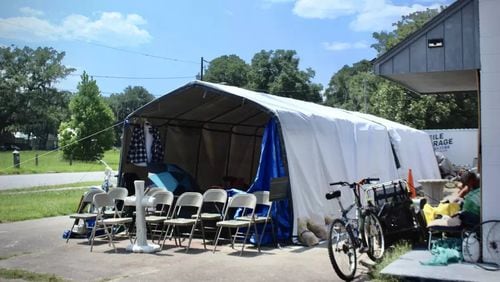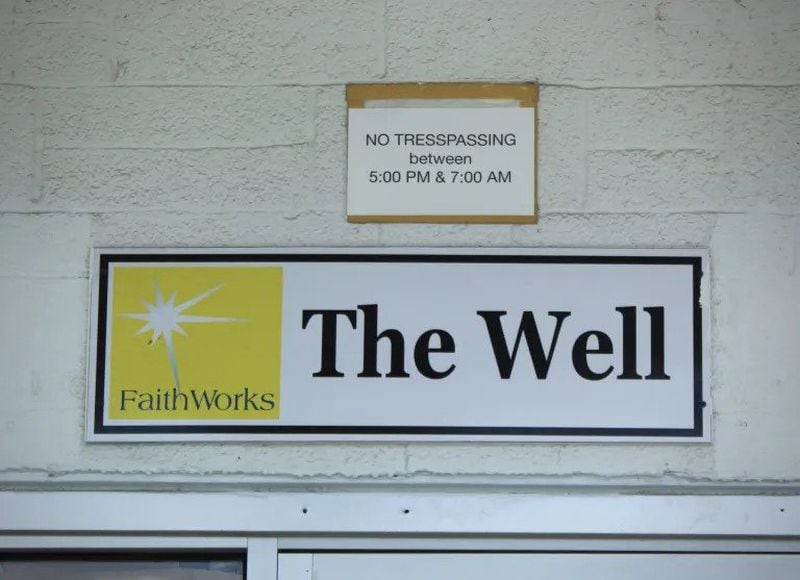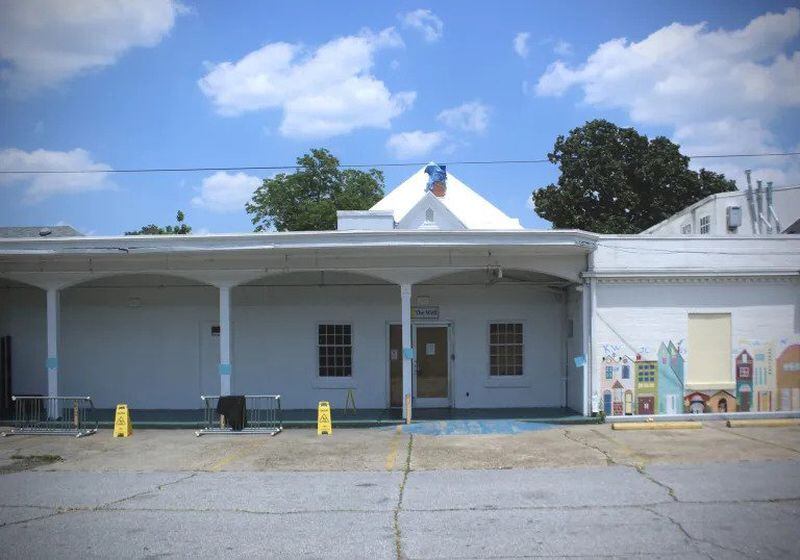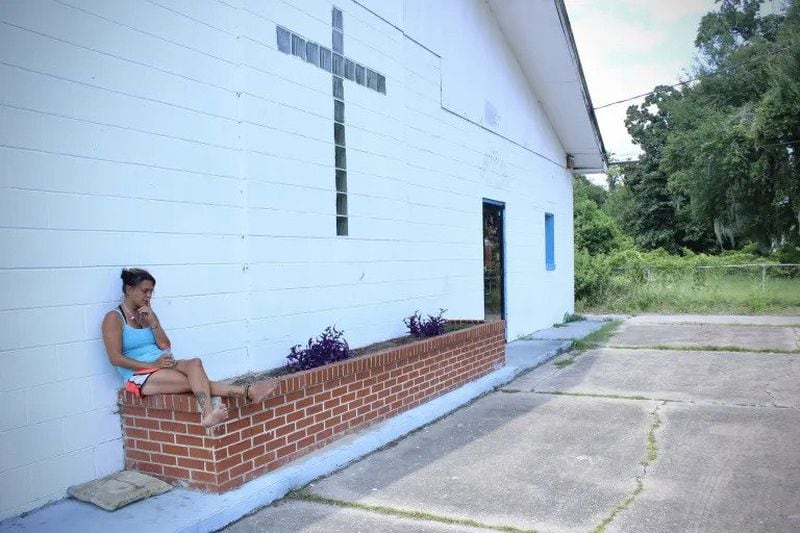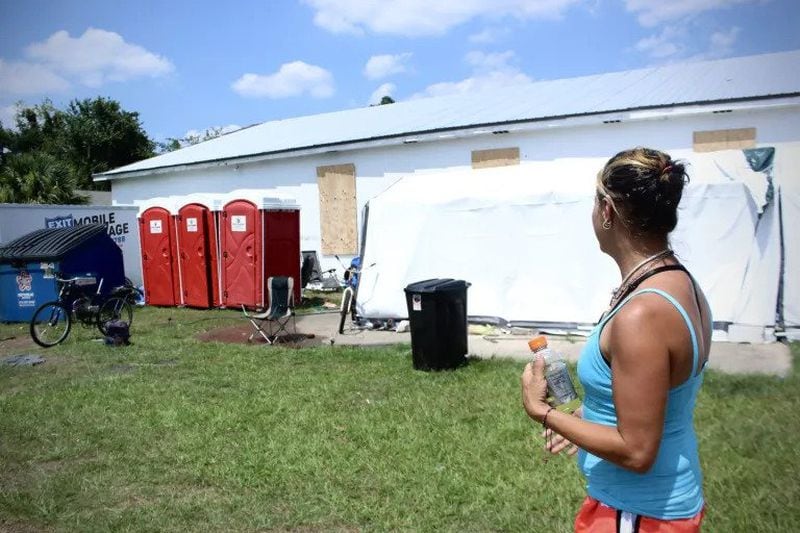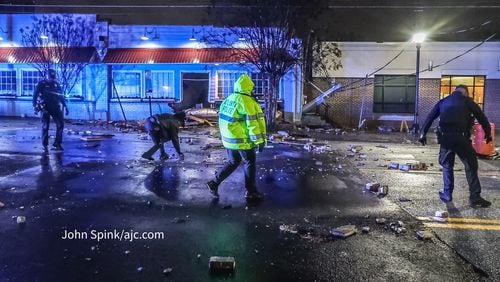This story was originally published by The Current GA.
More than two months after a showdown over what to do with Brunswick’s homeless population, city officials, business leaders and church groups remain at odds about how to serve the vulnerable unhoused community.
Homelessness providers from recently closed The Well and a ministry on the corner of Gordon and G streets as well as several churches have offered stop-gap measures to feed and shelter at least 100 people in downtown Brunswick.
Credit: Kailey Cota
Credit: Kailey Cota
Both the city and downtown business owners, however, have opposed these ideas, citing the perceived threats that the homeless community has to their customers and themselves.
The situation has become “borderline confrontational,” according to Police Chief Kevin Jones, who has urged the groups to create a consensual plan of action.
Yet advocates for the unhoused as well as spiritual leaders working downtown say they have hit a wall created by city officials who want to be the final arbiter of those services while expecting the nonprofit groups to pay for homeless services. The care providers see the government efforts as roadblocks.
Meanwhile, dozens of people have been left without a dependable source of food and shelter, and crime has not decreased in downtown Brunswick, according to police statistics.
“It’s tragic that the city of Brunswick and the county of Glynn have made no provisions for these people,” Savannah’s Rev. Leonard Small, who aids Brunswick’s homeless population, said. “They really wish they would either die, leave or disappear.”
The mayor’s office declined to comment. The city manager said during a June 28 meeting with stakeholders that it is the job of nonprofits – and not the government – to provide for the homeless.
Glynn’s challenge receives mixed support
Glynn County, like most places in America, struggles to serve its unhoused community. The Well, before it closed, served as a day shelter in town, while county-wide only nonprofits offered only about 25 beds for night shelter.
The groups offering these services are privately funded and well aware of the lack of capacity to handle the problem. The city and county have never prioritized these services, homeless advocates say.
City officials have been more sensitive to concerns from businesses and property owners about the homeless individuals who live downtown.
Police Chief Jones said there were 540 calls for service at The Well in 2022. But calls drastically increased, and in the six months before it closed – roughly November 2022 to April 2023 – there were 1,500 calls for service to the three blocks surrounding The Well, he said.
Credit: Kailey Cota
Credit: Kailey Cota
Calls for service do not directly indicate crime, and only about a third of calls lead to officers writing up an incident report, Jones said.
Five incidents involving people experiencing homelessness occurred from February to April, including an alleged assault, a stabbing, an armed robbery of a bike, an armed robbery with a machete and an alleged home invasion and rape of a minor, according to previous reporting by The Brunswick News.
Only one incident – the bike theft – involved a person who regularly received care at The Well, according to Rev. Culpepper.
The spate of violence became an urgent talking point for city officials. Mayor Cosby Johnson wrote a letter to The Well, urging it to shut down. The city said it identified The Well as a nuisance property, but its demand mentioned no code violations or zoning laws. The Well, at its current location on Gloucester Street, operates legally and does not require special permits.
Still, the shelter decided to voluntarily shut the doors for two months as an act of good faith, hoping that it would usher in a period of cooling down with city and county officials and offer the organization a way to update its facilities and safety protocols.
Staff also hoped to buy and use a new building, further away from the city center, as a 24/7 shelter. The city also declined to approve a permit to operate the space as a shelter, so The Well abandoned that deal.
Despite a lack of consensus with the city, The Well is gearing up to reopen now that the cooldown period it agreed to has passed. New members are receiving training and others are registering patrons in the hopes of opening during the week of July 24.
How the advocates have responded
When word spread of The Well closing, Savannah’s Rev. Leonard Small and Brunswick Rev. Zack Lyde set up a temporary camp for those who had nowhere to go.
Lyde allowed Small to lease a vacant church he owned on the corner of G and Gordon streets to shelter the homeless from Coastal Georgia’s sweltering temperatures and rainy season.
However, the group did not obtain an occupancy license or a permit for a new homeless shelter, and code enforcement noted there was no running water or electricity, so it was boarded up and deemed uninhabitable four days after The Well closed, according to Jones.
Credit: Kailey Cota
Credit: Kailey Cota
A community member donated a tent, which about 20 people used as a shelter until rain and bad weather collapsed it several weeks ago. Small then bought two 12-by-20 foot open air shed-like structures that now provide shelter in the parking lot.
The group did not get a permit for either shelter, and there is disagreement about whether a permit is necessary.
“It was a bullying tactic,” Small said. “These people are then basically told living outside of a building is safer than being inside of a structure.”
Business community worries about crime
While crime was a major reason why the community called for The Well to close, it has not substantially decreased since its doors have been closed.
Suspicious person calls have not significantly dropped since The Well closed, Jones said.
This is despite the fact that people have stopped sleeping on The Well’s porch, and are migrating to other places like the G Street location, near the riverfront or are dispersing throughout the county.
Residents who participated in a recent meeting with stakeholders had a different perception.
Several neighborhood leaders said that they noticed a considerable difference in the historic downtown, saying they felt safer and that foot traffic increased.
Travis Stegall of the Historic Brunswick Neighborhood Planning Assembly, asked why The Well hadn’t asked the community what they thought of the shelter until now.
“You’d have to walk down Gloucester (Street) with a blindfold not to see how things affect us,” another neighborhood leader said.
Police Chief Jones tried to inject some data into what turned into an emotional debate. Crime is not the fault of The Well or the homeless population, Jones said – “It’s just what’s going on,” he said.
What about the unhoused?
Lost in the political debates about where or how to help the unhoused are members of this community themselves.
Twenty years ago, one woman experiencing homelessness was freshly married, owned a house on Egmont Street, and had a stable job.
Even though she had dropped out of high school in ninth grade, she got her GED and was working as a concierge on St. Simons Island. But her life deteriorated as her drug addiction raged, and the stability she was trying to build for herself faded away.
When someone threw her purse in the river surrounding Brunswick, it left her without a birth certificate, Social Security card, ID or money.
Now 41, she’s been homeless off and on for a decade.
“I’m super intelligent but I’m really dumb at the same time. I have no common sense, or I just can’t apply it, or whatever. I know what I’m supposed to do, but I can’t seem to get right,” she said.
She’s depended on The Well for service for years, and is currently staying at the homeless encampment at 1803 G Street.
But because she has a loud personality that can clash with the other 20 people who are temporarily calling the spot on G Street home, she said she prefers to spend her nights sleeping alone in the woods.
“I have three raccoons, two cats and the birds,” she said. “I have to have my little bit of solace and my little bit of nature.”
She was in the process of getting legal identification when The Well closed. She wants to work with The Well again when it reopens. She needs a birth certificate, Social Security card and state ID if she has any hope of progressing out of homelessness.
What next?
While advocates for the unhoused wait for the court hearings about what stop-gap measures they will be allowed to continue using, volunteers continue to bring food and water to the dozens of people who used to be served by The Well.
Small’s ministry, Litway Missionary Baptist Church, also funded three portable toilets and a dumpster to add to the G Street location.
Credit: Kailey Cota
Credit: Kailey Cota
One of the portable toilet units is set aside for showering, and people bring a garden hose and donated shampoo into the plastic container to clean themselves.
Small believes he has enough funding to keep his ministry on G Street open for at least two or three more years, or until there are better resources in Brunswick.
“It’s tragic that the city of Brunswick and the county of Glynn have made no provisions for these people,” Small said. “They really wish they would either die, leave or disappear.”
There have been seven calls for service at the G Street location where Small’s Litway Missionary Baptist Church operates. Two of the calls ended in Rev. Lyde – the lifelong Civil Rights advocate who rents out the building to Small – being arrested.
In the first instance, Lyde was charged with battery against one of the people experiencing homelessness who used to stay at the G Street property. Lyde was released from jail shortly after, but was arrested again on June 16 and charged with aggravated assault.
The pastor’s daughter, Brandi Lyde Whitfield, said her father was provoked. He spent Father’s Day and his 84th birthday in jail before his family was able to post bail late on June 26.
Lyde has not returned to the G Street shelter since, according to Lyde Whitfield.
Meanwhile, The Well’s leaders struggle toward building capacity for a service they believe is part of God’s commandment.
This summer, the city passed a new conditional use permit and license that is now required for any business, non-profit or organization to open and operate as a homeless shelter within the city.
The ordinance requires homelessness service providers to have a minimum of a 25-foot-wide buffer on all property lines. It also says the property with the homeless shelter cannot be used for anything else, and that loitering, camping or sleeping at the shelter or surrounding sheets is prohibited.
It makes it almost impossible to open a new homeless shelter, Lyde Whitfield said.
Because The Well was open before the ordinance passed, it is not required to go through the permitting process. However, the city and other business leaders have asked The Well to submit itself to the new process anyway.
Meanwhile, the group has shared new security measures that they hope will appease their neighbors. These include having each guest register with a government-issued ID, submit to a background check if staff deem it necessary and to install camera systems to monitor behavior both on and off the property.
Another improvement that may be coming to the city includes a Brunswick Homeless Coalition that Jeff Clark, a Brunswick native and the street outreach director for Safe Harbor Children’s Center, is planning.
“The city is not helping us find answers easily,” said Jenna Kennedy, FaithWorks Minister of Operations at The Well. “Every city official I’ve met does have a heart for this population, but as a whole we need to make some easier pathways to get safe services provided.”
Credit: The Current GA
Credit: The Current GA
MEET OUR PARTNER
This story comes from our partner, The Current GA, an inclusive nonprofit, independent news organization which provides in-depth watchdog journalism for Savannah and Coastal Georgia’s communities. Sign up for their newsletter here.
If you have any feedback or questions about our partnerships, you can contact Senior Manager of Partnerships Nicole Williams via email at nicole.williams@ajc.com.
